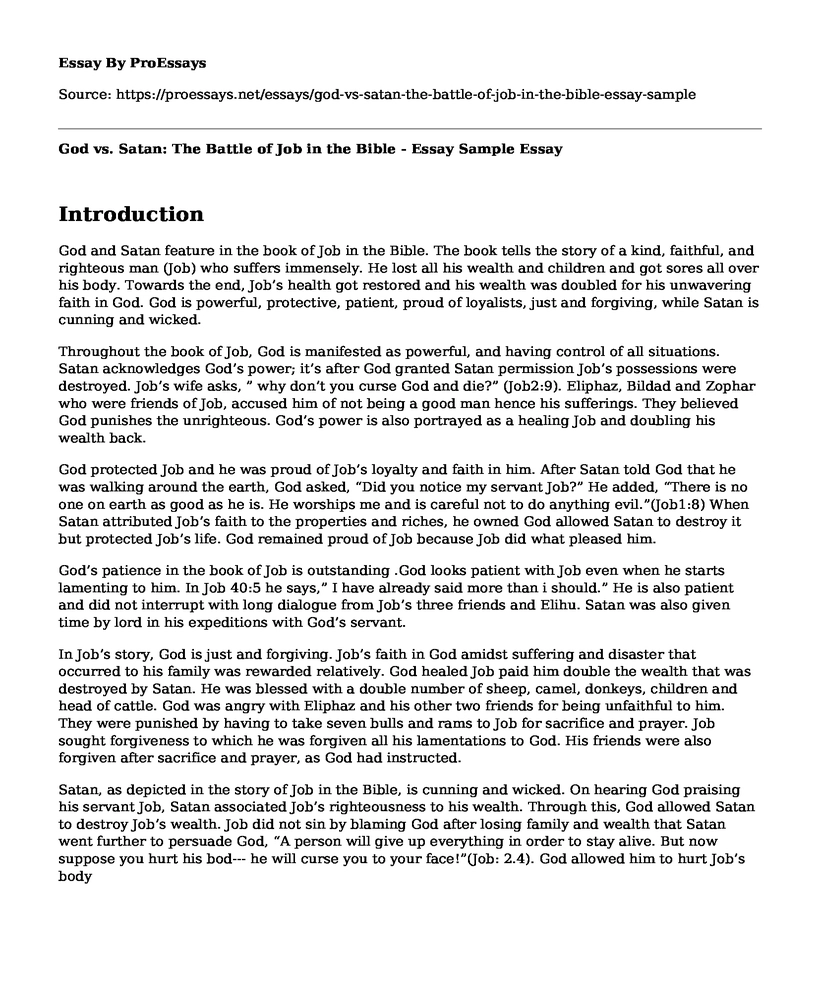Introduction
God and Satan feature in the book of Job in the Bible. The book tells the story of a kind, faithful, and righteous man (Job) who suffers immensely. He lost all his wealth and children and got sores all over his body. Towards the end, Job’s health got restored and his wealth was doubled for his unwavering faith in God. God is powerful, protective, patient, proud of loyalists, just and forgiving, while Satan is cunning and wicked.
Throughout the book of Job, God is manifested as powerful, and having control of all situations. Satan acknowledges God’s power; it’s after God granted Satan permission Job’s possessions were destroyed. Job’s wife asks, ” why don’t you curse God and die?” (Job2:9). Eliphaz, Bildad and Zophar who were friends of Job, accused him of not being a good man hence his sufferings. They believed God punishes the unrighteous. God’s power is also portrayed as a healing Job and doubling his wealth back.
God protected Job and he was proud of Job’s loyalty and faith in him. After Satan told God that he was walking around the earth, God asked, “Did you notice my servant Job?” He added, “There is no one on earth as good as he is. He worships me and is careful not to do anything evil.”(Job1:8) When Satan attributed Job’s faith to the properties and riches, he owned God allowed Satan to destroy it but protected Job’s life. God remained proud of Job because Job did what pleased him.
God’s patience in the book of Job is outstanding .God looks patient with Job even when he starts lamenting to him. In Job 40:5 he says,” I have already said more than i should.” He is also patient and did not interrupt with long dialogue from Job’s three friends and Elihu. Satan was also given time by lord in his expeditions with God’s servant.
In Job’s story, God is just and forgiving. Job’s faith in God amidst suffering and disaster that occurred to his family was rewarded relatively. God healed Job paid him double the wealth that was destroyed by Satan. He was blessed with a double number of sheep, camel, donkeys, children and head of cattle. God was angry with Eliphaz and his other two friends for being unfaithful to him. They were punished by having to take seven bulls and rams to Job for sacrifice and prayer. Job sought forgiveness to which he was forgiven all his lamentations to God. His friends were also forgiven after sacrifice and prayer, as God had instructed.
Satan, as depicted in the story of Job in the Bible, is cunning and wicked. On hearing God praising his servant Job, Satan associated Job’s righteousness to his wealth. Through this, God allowed Satan to destroy Job’s wealth. Job did not sin by blaming God after losing family and wealth that Satan went further to persuade God, “A person will give up everything in order to stay alive. But now suppose you hurt his bod--- he will curse you to your face!”(Job: 2.4). God allowed him to hurt Job’s body
Conclusion
In conclusion, God, throughout the story of Job in the Bible, portrays several characteristics like power when he heals Job. He also forgives Job When misery had made him complain to his God. God proves to be just by rewarding righteous and punishing wrongdoing. Satan shows his wickedness by destroying Job while God proves to be the creator and sustainer of the earth and universe by giving back Job more than he had lost.
Cite this page
God vs. Satan: The Battle of Job in the Bible - Essay Sample. (2023, Aug 16). Retrieved from https://proessays.net/essays/god-vs-satan-the-battle-of-job-in-the-bible-essay-sample
If you are the original author of this essay and no longer wish to have it published on the ProEssays website, please click below to request its removal:
- The Nature of Faith Essay
- Interfaith Religious Marriage Paper Example
- The Constitution of Medina - Essay Sample
- Essay Sample on God in Biblical Books
- Religion, Spirituality, and Healthcare: Essay Sample
- Essay Example on Christian Educators: Quality Learning Arrangements & Technology Advances
- Christian Missions: Spreading the Faith Across the Globe - Essay Sample







